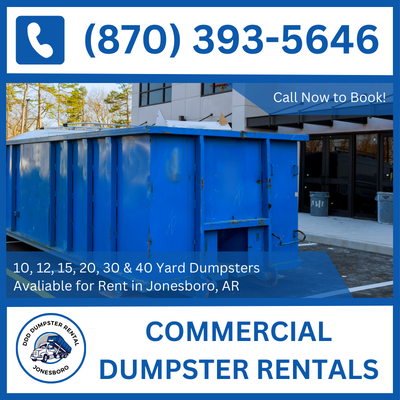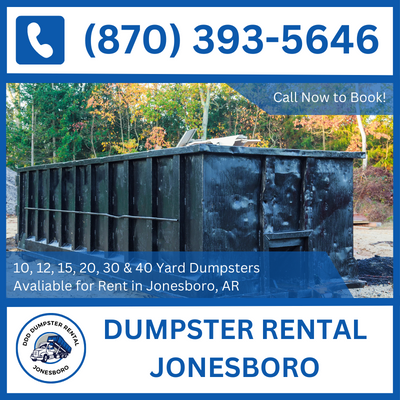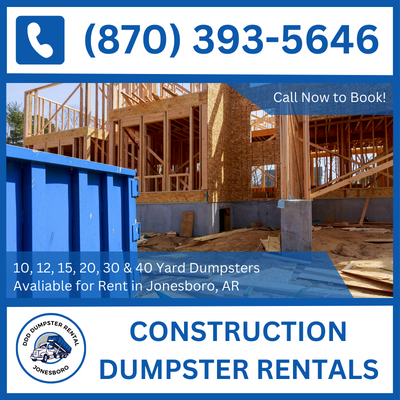- Get link
- X
- Other Apps
- Get link
- X
- Other Apps
Maximizing Efficiency in Commercial Property Upgrades with Strategic Dumpster Rentals
Commercial property upgrades are essential for maintaining a competitive edge and attracting tenants, but they often come with a significant challenge: managing the substantial amount of waste generated during the process. From construction debris to discarded fixtures and materials, the accumulation of waste can quickly become overwhelming, leading to potential safety hazards, environmental concerns, and costly delays. This is where strategic dumpster rentals come into play, offering a comprehensive solution to streamline your commercial property upgrade and enhance overall efficiency.
By leveraging the power of commercial dumpster rentals, businesses can:
- Centralize waste containment and disposal
- Minimize disruption to daily operations
- Promote a safe and clutter-free work environment
- Facilitate efficient cleanup and debris removal
In this article, we will explore the key benefits of dumpster rentals for commercial property upgrades, guide you through the process of choosing the right dumpster size, and provide insights on navigating weight limits and disposal costs. Moreover, we will delve into responsible waste management practices and showcase real-world case studies of successful dumpster rental strategies in action. By the end of this comprehensive guide, you will be well-equipped to maximize efficiency in your commercial property upgrade through the strategic implementation of dumpster rentals.
Understanding the Benefits of Dumpster Rentals for Commercial Properties
Hey there, fellow commercial property owners and managers! Let's talk about the unsung hero of your next big upgrade project: the mighty dumpster rental. I know, I know, it might not sound like the most thrilling topic, but trust me, once you discover the benefits of having a dumpster on your side, you'll be singing its praises from the rooftops (figuratively, of course – safety first!).
First and foremost, dumpster rentals are like the ultimate waste management sidekick. They provide a centralized waste containment and disposal solution that keeps your property clean and organized throughout the entire upgrade process. No more scattered debris piles or overflowing trash bins – with a dumpster, you've got a designated spot for all that construction and renovation waste.
But the benefits don't stop there! By having a dumpster on-site, you'll be minimizing disruption to your daily business operations. Instead of constantly shuttling waste off-site or dealing with multiple smaller disposal runs, you can simply toss everything into the dumpster and let the rental company handle the rest. It's like having a magic portal that makes all your waste disappear (minus the fancy special effects, unfortunately).
Plus, a dumpster rental is like a giant safety blanket for your property. It helps promote a safe and clutter-free work environment by keeping all the debris contained in one spot. No more tripping hazards or navigating around piles of rubble – your team can focus on the task at hand without worrying about the mess.
And let's not forget about the time-saving aspect! With a dumpster, you'll be able to facilitate efficient cleanup and debris removal, which means your project will stay on track and on schedule. No more wasting precious hours trying to figure out how to dispose of all that waste – just toss it in the dumpster and move on to the next task.
|
Benefit |
Description |
| Centralized waste containment and disposal | Keeps your property clean and organized |
| Minimizing disruption to daily operations | Reduces the need for multiple disposal runs |
| Safe and clutter-free work environment | Prevents tripping hazards and maintains focus |
| Efficient cleanup and debris removal | Saves time and keeps your project on schedule |
So, there you have it – the undeniable benefits of dumpster rentals for your commercial property upgrade. It's like having a superhero sidekick that tackles all your waste management woes, leaving you free to focus on the exciting parts of your project. And who doesn't want a superhero on their team?
Choosing the Right Dumpster Size for Your Project
Alright, folks, it's time to dive into the exciting world of dumpster sizes! Yes, you heard that right – there's more to dumpster rentals than meets the eye. Choosing the right size for your commercial property upgrade is like finding the perfect pair of shoes – it's all about the fit.
First things first, let's talk about assessing the scope and scale of your project. Are you tackling a minor renovation or a full-blown overhaul? The size of your project will have a big impact on the size of the dumpster you'll need. It's like planning a dinner party – you wouldn't cook for a group of 20 if you're only expecting 5 guests, right?
Now, let's break down the common dumpster sizes and their capacities:
- 10-yard dumpsters: These compact cuties are perfect for smaller projects, like a small office renovation or a minor retail store facelift. They can hold about 10 cubic yards of waste, which is roughly equivalent to 3-5 pickup truck loads.
- 20-yard dumpsters: If your project is a bit more substantial, like a medium-sized retail store renovation or a small restaurant upgrade, a 20-yard dumpster might be your best bet. These bad boys can hold up to 20 cubic yards of waste, which is about 6-8 pickup truck loads.
- 30-yard dumpsters: Now we're talking serious business! 30-yard dumpsters are ideal for larger commercial projects, like a full-scale office building renovation or a major industrial facility upgrade. They can accommodate up to 30 cubic yards of waste, which translates to about 9-12 pickup truck loads.
- 40-yard dumpsters: For the biggest and baddest projects out there, the 40-yard dumpster is your ultimate waste management companion. These giants can hold up to 40 cubic yards of waste, which is roughly equivalent to 12-16 pickup truck loads. Perfect for extensive construction and demolition projects!
But wait, there's more to consider than just the size of your project! You'll also want to think about the type and volume of waste materials you'll be dealing with. Will you have mostly concrete and masonry debris, or will there be a mix of drywall, flooring materials, and scrap metal? Different materials have different weights and densities, which can affect how much your dumpster can hold.
|
Material |
Weight (lbs/cubic yard) |
| Concrete | 4,000-8,000 |
| Drywall | 400-600 |
| Wood | 300-600 |
| Metal | 800-2,000 |
Another factor to keep in mind is the project timeline and duration. If you're working on a tight schedule, you might need to opt for a larger dumpster to avoid multiple rentals and exchanges. On the other hand, if you have a bit more flexibility, you could potentially save some cash by going with a smaller dumpster and scheduling more frequent pickups.
Last but not least, don't forget to consider the available space for dumpster placement on your commercial property. You'll need a spot that's easily accessible for both your team and the rental company's pickup and delivery trucks. It's like playing a game of Tetris, but with giant metal boxes!
So there you have it, my friends – the key factors to consider when choosing the right dumpster size for your commercial property upgrade. It might seem overwhelming at first, but with a little bit of planning and forethought, you'll be a dumpster rental pro in no time!
Navigating Weight Limits and Disposal Costs
Buckle up, folks, because we're about to dive into the thrilling world of weight limits and disposal costs! I know, I know, it might not sound like the most exciting topic, but trust me, understanding these concepts can save you a lot of headaches (and cash) in the long run.
First things first, let's talk about weight restrictions for different dumpster sizes. It's like a real-life game of "Guess Who?" but instead of trying to guess your opponent's mystery character, you're trying to guess how much weight your dumpster can handle before it taps out.
|
Dumpster Size |
Weight Limit (lbs) |
| 10-yard | 1-2 tons |
| 20-yard | 2-3 tons |
| 30-yard | 3-4 tons |
| 40-yard | 4-6 tons |
Now, I know what you're thinking – "How the heck am I supposed to estimate the weight of all my construction and renovation materials?" Don't worry, my friend, I've got you covered. Let's break it down:
- Concrete and masonry debris: These chunky monkeys are the heavyweights of the waste world. A cubic yard of concrete can weigh anywhere from 4,000 to 8,000 pounds. So, if you're tossing out a lot of concrete, make sure your dumpster can handle the heat!
- Drywall and flooring materials: Drywall and flooring materials are like the middle children of the waste family – not too heavy, not too light. A cubic yard of drywall typically weighs between 400 and 600 pounds, while carpeting and padding can range from 200 to 400 pounds per cubic yard.
- Scrap metal and roofing components: Scrap metal is like the superhero of the waste world – it's strong, dense, and can really pack a punch. A cubic yard of scrap metal can weigh anywhere from 800 to 2,000 pounds. And don't even get me started on roofing materials – a cubic yard of shingles can weigh up to 1,000 pounds!
But wait, there's more! Let's talk about some strategies for minimizing overage fees and disposal costs:
- Proper material segregation and recycling: By separating your recyclable materials (like metal, cardboard, and untreated wood) from your non-recyclable waste, you can potentially reduce your overall disposal costs. Plus, you'll be doing a solid for the environment!
- Avoiding mixing heavy and light waste items: Remember those weight limits we talked about earlier? Well, if you mix heavy items (like concrete) with lighter materials (like drywall), you might hit that weight limit faster than you can say "dumpster dive." Try to keep your heavy and light waste separate to maximize your dumpster's capacity.
- Regularly monitoring dumpster fill levels: It's like playing a game of "I Spy" with your dumpster. Keep an eye on how quickly it's filling up, and if you notice it's getting close to the top, give your rental company a call to schedule a pickup before you go over the weight limit.
And there you have it, folks – the ins and outs of navigating weight limits and disposal costs for your commercial dumpster rental. With a little bit of planning and some strategic thinking, you'll be able to keep your project on track and your wallet happy.
Responsible Waste Management Practices
Alright, friends, it's time to talk about something near and dear to my heart – being a responsible waste management superhero! Yes, you heard that right. By implementing eco-friendly practices during your commercial property upgrade, you can help save the planet one dumpster at a time.
First, let's discuss the environmental impact of construction and renovation waste. Did you know that construction and demolition debris accounts for nearly a quarter of all waste generated in the United States? That's a lot of stuff ending up in landfills! But fear not, my eco-conscious comrades, because there are ways to reduce your environmental footprint.
One of the best ways to be a waste management warrior is by implementing eco-friendly disposal methods. Here are a few tips:
- Recycling eligible materials: Many construction and renovation materials can be recycled, such as metal, cardboard, untreated wood, and even some types of plastic. By sorting these materials and sending them to the appropriate recycling facilities, you're giving them a second life and keeping them out of landfills.
- Donating reusable items: Just because something doesn't fit into your upgraded space doesn't mean it has to go to waste. Consider donating reusable items like doors, windows, lighting fixtures, and appliances to local charities or habitat for humanity organizations. Not only will you be reducing waste, but you'll also be helping out those in need.
- Properly disposing of hazardous waste: Some construction and renovation materials, such as paints, solvents, and adhesives, can be hazardous to the environment if not disposed of properly. Make sure to follow local regulations and guidelines for disposing of these materials safely.
But wait, there's more! Another way to be a responsible waste manager is by partnering with reputable dumpster rental providers like DDD Dumpster Rental Jonesboro committed to sustainability. Look for companies that prioritize eco-friendly practices, such as:
- Using fuel-efficient trucks for pickup and delivery
- Recycling and repurposing materials whenever possible
- Properly disposing of hazardous waste
- Offering eco-friendly dumpster options (like those made from recycled materials)
By choosing a dumpster rental provider that shares your commitment to the environment, you'll be able to sleep soundly at night knowing that you're doing your part to reduce waste and protect our planet.
|
Eco-Friendly Practice |
Benefits |
| Recycling eligible materials | Reduces waste in landfills, conserves resources |
| Donating reusable items | Helps those in need, reduces waste |
| Properly disposing of hazardous waste | Protects the environment and public health |
| Partnering with sustainable dumpster rental providers | Supports eco-friendly practices, reduces environmental impact |
So there you have it, my friends – a crash course in responsible waste management practices for your commercial property upgrade. By implementing these strategies and partnering with like-minded professionals, you'll be well on your way to becoming a waste management superhero. And who knows, maybe you'll even get a cool cape and theme song out of it!
Conclusion
Congratulations, my friends! You've made it to the end of our thrilling journey through the world of strategic dumpster rentals for your commercial property upgrade. Let's take a moment to recap the key takeaways:
- Dumpster rentals offer a centralized solution for waste management, minimizing disruption to your daily operations and promoting a safe, clutter-free work environment.
- Choosing the right dumpster size is crucial for accommodating your project's specific needs and avoiding unnecessary costs.
- Understanding weight limits and disposal costs can help you make informed decisions and minimize overage fees.
- Implementing responsible waste management practices, such as recycling, donating reusable items, and properly disposing of hazardous waste, can significantly reduce your project's environmental impact.
By incorporating these strategies and partnering with a reputable dumpster rental provider, you'll be well-equipped to tackle your commercial property upgrade with efficiency and eco-friendliness.
So, what are you waiting for? Embrace the power of strategic dumpster rentals and watch your project soar to new heights! With a little bit of planning and a lot of enthusiasm, you'll be the talk of the town (and the toast of the waste management world).



Comments
Post a Comment